From Maria San Filippo and the team behind After “Happily Ever After”: Romantic Comedy in the Post-Romantic Age.
Post-Romantic Comedy
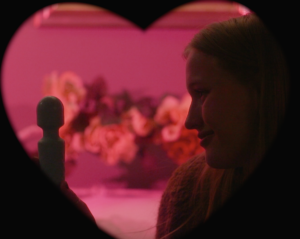
To coincide with the publication of After “Happily Ever After”: Romantic Comedy in the Post-Romantic Age, newly available from Wayne State University Press, this collaboratively-created playlist features several of the collection’s contributors offering their recommendations of “post-romantic comedies”: works from the last 15-ish years that contend with the disillusionment wrought by the tired tropes of (neo)traditional romcom, and by the real-world concerns and complications that make romantic partnerships – in all their varying forms – ever more challenging yet potentially rewarding in today’s complex, precarious world. Rather than sunsets and soulmates, post-romantic comedies portray the healing powers of human connection through love and laughter.
As explored in the book’s introduction, titled “Love Actually: Romantic Comedy Since the Aughts” and available for download, perhaps the most prominent marker of post-romantic comedy is realism – a willingness to embrace rather than shrink from the realities of romance and the labors of love. Far from laborious viewing, however, these romcoms rejuvenate the genre through their updated sensibility, representational inclusivity, and creative innovation. Encompassing a range of film and television – indie, international, online – this sampler of post-romantic comedy is sure to satisfy every romcom lover’s sweet-tooth without being saccharine or sentimental.
Before delving into our recommendations, we invite you to watch our trailer, also collaboratively created by a talented team of Emerson College graduate students, and get a peek at our Table of Contents. You might also enjoy listening to an interview with the book’s editor Maria San Filippo featured on ABC Radio National’s The Screen Show (segment begins at 29:00). If you feel moved to acquire your very own copy, please enjoy a 30% discount using code SS21 when ordering directly from WSUP through June 2021.
Without further ado, our playlist! All titles are widely available to watch; check justwatch.com for streaming and purchasing options. Happy viewing!
From John Alberti (Northern Kentucky University), contributor and author of Masculinity in the Contemporary Romantic Comedy: Gender as Genre (Routledge, 2013)
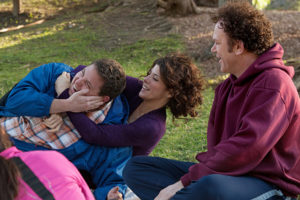
Cyrus (Jay and Mark Duplass, 2010): Cyrus mixes the bromance with mumblecore to create a cringe-worthy Oedipal love triangle involving a lonely 40-something divorced man (John C. Reilly), the 40-something single mother he starts a relationship with (Marisa Tomei), and her 21-going-on-13-year-old son (Jonah Hill) with major boundary issues. In 2012, I described it as “a neo-realist high concept bromance about male obsolescence,” and the movie still works as an example of how the post-romantic rom com began to recognize and respond to masculine pathology and changing ideas of gender performance.
From Elizabeth Alsop (CUNY School of Professional Studies), contributor and author of Making Conversation in Modernist Fiction (The Ohio State University Press, 2019)

Boynton Beach Club (Susan Seidelman, 2005): Come for the great performances by Brenda Vaccaro and Dyan Cannon, stay for the snappy pacing and Seidelman’s signature buoyancy, only lightly tempered by realism. Set in a Florida retirement community, the film offers some thoughtful insights into friendship, sex, and love over 60.
From Ash Kinney d’Harcourt (University of Texas at Austin), contributor

Pushing Daisies (Bryan Fuller, ABC, 2007-2009):
The romantic tension in Fuller’s hybrid fairy-tale-mystery-romantic-comedy between the two would-be lovers—a pie-maker with a deadly touch (Lee Pace) and his free-spirited childhood crush (Anna Friel)—lasts twenty-two delicious episodes. The series also single-handedly meets the camp quota for early 2000s television in its wordplay (loads of double entendre), the eccentric styling of the mise-en-scène (think Amélie on acid), and spontaneous musical performances by the Broadway supporting cast (Kristin Chenoweth and Ellen Greene among others). Drawing on the romcom genre, the show tells the stories of closeted, unrequited, or star-crossed, yet enduring, love for its queer-coded characters, and the masked kissing and gloved hand-holding on screen remains uncannily relevant in this time of love-while-social-distancing.
Mary Harrod (University of Warwick), contributor and author of From France with Love: Gender and Identity in French Romantic Comedy (I.B. Tauris, 2015)

I Am Not an Easy Man (Netflix, 2018)
Incorrigible Parisian playboy Damien has his world turned upside down after a head injury renders it a matriarchal society. Now Damien experiences objectification, belittlement and harassment in all walks of life. But can he persuade his promiscuous love interest Alexandra that the sexes are fundamentally more alike than she thinks?
From Betty Kaklamanidou (Aristotle University), contributor and author of Gender, Genre, and the Effects of Neoliberalism: The New Millennium Hollywood Rom Com (Routledge, 2013)
The first ones I’ll propose are the “last” of the greats!
- The Proposal (Anne Fletcher, 2009) Why? Sandra Bullock as a tyrannical editor. Ryan Reynolds as her assistant. Getting married so that Sandra gets a green card. Ryan Reynolds’ abs on full display. And Betty White as his grandma? What more does anyone need?
- Crazy, Stupid, Love (Glen Ficarra and John Requa, 2011). Steve Carrell getting a makeover by Ryan Gosling? Emma Stone and Gosling dancing “I’ve had the time of my life?” The latter’s abs on full display? Need I say more?
- Destination Wedding (Victor Levin, 2018). Uniting Keanu Reeves and Winona Ryder… Pondering on middle-life crisis and falling in love, yet again. Oh Yes. Only for Gen-xers. Precious.
- Isn’t it Romantic (Todd Strauss-Schulson, 2019). Rebel Wilson as the star of a romcom, that’s why.
- Always Be My Maybe (Nahnatchka Khan, 2019). Ali Wong, that’s why. Cultural diversity and the best guest star ever (Keanu Reeves you have my eternal respect).
Finally, the best romcom, hands down, of the 2010s came at its close:

Palm Springs (Max Barbakow, 2020):
Great script, great performances, fabulous use of the time-loop device. Yes, it is possible to fall in love in the 2020s.
From Suzanne Leonard (Simmons University), promotional endorser and author of Wife, Inc.: The Business of Marriage in the Twenty-First Century (New York University, 2018)
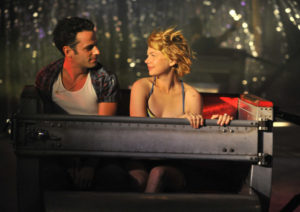
I recommend Sarah Polley’s Take This Waltz (2011) for its utterly humane and poignant examination of a married woman who finds herself falling in love with a different man. Without resorting to shaming or prurience, or the sort of morality lessons that so often underpin stories of female adultery, Take This Waltz is instead both realistic and heart-breaking. The film concludes with a tour de force 360-degree montage that is sexy, passionate, tender and even, at times, beautifully mundane.
From Tamar Jeffers McDonald (University of Kent), contributor and author of Romantic Comedy: Boy Meets Girl Meets Genre(Columbia University Press, 2007)
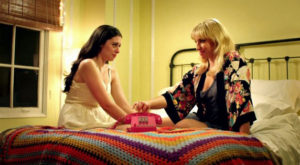
For A Good Time, Call…. (Jamie Travis, 2012)
I love it because it emphasises the importance of female friendship, is surprisingly filthy, has great performances, and includes a training montage that manages to channel both When Harry Met Sally… and Dirty Dancing!
From Beatriz Oria (University of Zaragoza), contributor and author of Talking Dirty on Sex and the City: Romance, Intimacy, Friendship (Rowman & Littlefield, 2014)
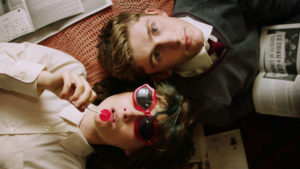
Dating Amber (David Freyne, 2020)
Two closeted gay teenagers growing up in 90s rural Ireland fake date to survive high school. Paradoxically, this delightful platonic queer love story might represent the ultimate post-romantic romcom much better than some of its contemporaries… because it is not really a romcom.
From Maria San Filippo, editor-contributor and author of Provocauteurs and Provocations: Screening Sex in 21st Century Media (Indiana University Press, 2021)
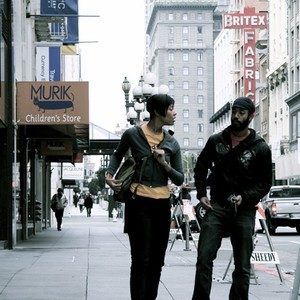
Medicine for Melancholy (Barry Jenkins, 2008)
Like his much better-known Moonlight, Jenkins’ directorial debut is quietly and beautifully devastating. Two strangers wake up next to each other, then spend the next twenty-four hours getting to know one another as they traverse a rapidly gentrifying San Francisco.
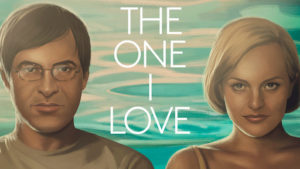
The One I Love (Charlie McDowell, 2014)
Being John Malkovich meets Eternal Sunshine of the Spotless Mind meets Groundhog Day meets the “San Junipero” episode of Black Mirror. Elisabeth Moss and Mark Duplass play monotonously marrieds who find a couples’ getaway offers a (literal) portal to their better selves and the relationship they desire, or does it…?

Trigonometry (Athina Rachel Tsangari, BBC Two/HBO Max, 2020-)
With its polyamory premise and both its creator and star hailing from the Greek Weird Wave, this soul-affirming series about a longtime Black British couple and their younger white French tenant forging an alternative relationship in contemporary London was a welcome reprieve during the early days of lockdown.

This a a great list! May I give my two cents by introducing two post-romantic comedies in Mainland China during the 2010s: Ex-files 前任攻略 and The Ex-File 3: The Return of the Exes 前任3:再見前任. As the titles suggest the motif is break-up instead of happy reunion. They are male-centred rom-coms, full of sex jokes, but also addressing the crisis of masculinity. Main characters in these films manage relationships strategically like calculating entrepreneurs who try to maximise their interests, yet they have to endure the risk and anxiety of any setback.
Thank you for these suggestions! It’s wonderful to add to this list. And if you have any ideas for a list, please do send them my way! -Leshu
These are terrific recommendations, thank you Bruce! I think you’ll especially appreciate Tom Cunliffe’s chapter in our edited collection on the post-romantic comedies of Johnnie To, Don’t Go Breaking My Heart 1 & 2!